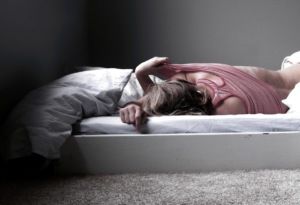News
The perils of peeing at night: Scientists establish strong link to increased risk of dementia
This article is more than 4 years old.
Frequently needing to get up to urinate will increase the chances of developing Alzheimer’s disease by 16 percent, Danish-US study contends

Not again! (photo: c kennedy garrett)
Spending a penny during the night is never good news. There’s the increased risk you might step on a piece of Lego, encounter a burglar or even hear your parents having sex.
Of course, some children have a tendency to do it in their actual bed, turning a pyjama party into a wet t-shirt contest whilst worrying their parents (after they google the Macdonald Triad theory) that they might be a prospective serial killer.
In adulthood, such behaviour is rare, unless you have a serious drinking problem. But feeling the need to urinate remains bad news, as it’s an indicator you are increasing your risk of developing dementia, according to a study by Aarhus University and Stanford University in the US.
21 percent higher risk
The study’s focus was men over the age of 60 with a benign prostate enlargement, who typically have to get up multiple times during the night to urinate.
The study found that such men had a 21 percent higher risk of developing dementia than men of the same age who do not have prostate problems. The risk of developing Alzheimer’s disease grows by 16 percent.
In total, it assessed the records of 1.4 million men in Denmark over a ten-year-period.
Like a washing machine
The interruption to a night’s sleep is not good news as it can lead to an accumulation of waste products in the brain, the study’s authors contend. The repeated presence of the protein fragment beta-amyloid in the affected men’s brains, for example, suggested this.
Going to sleep, the study explains, is like turning on the brain’s washing machine. Meningeal fluid flushes the glymphatic system, leaving via nerves and lymph vessels, taking the waste products away with it.
Interrupt the sleep cycles – most people tend to have two or three, depending on whether they sleep closer to six or nine hours – and the flushing will not work as it should.
More help needed
“As I see it, the figures point to the importance of helping these men get as cohesive a night’s sleep as possible – not least to protect them as best as possible from developing dementia,” concluded one of the study’s authors, Professor Mette Nørgaard from Aarhus University, speaking to BT.
“We expect that the same group of women may also have an increased risk of dementia.”
The results of the study, which was supported by the Lundbeck Foundation, has been published in the scientific journal EClinicalMedicin.










































